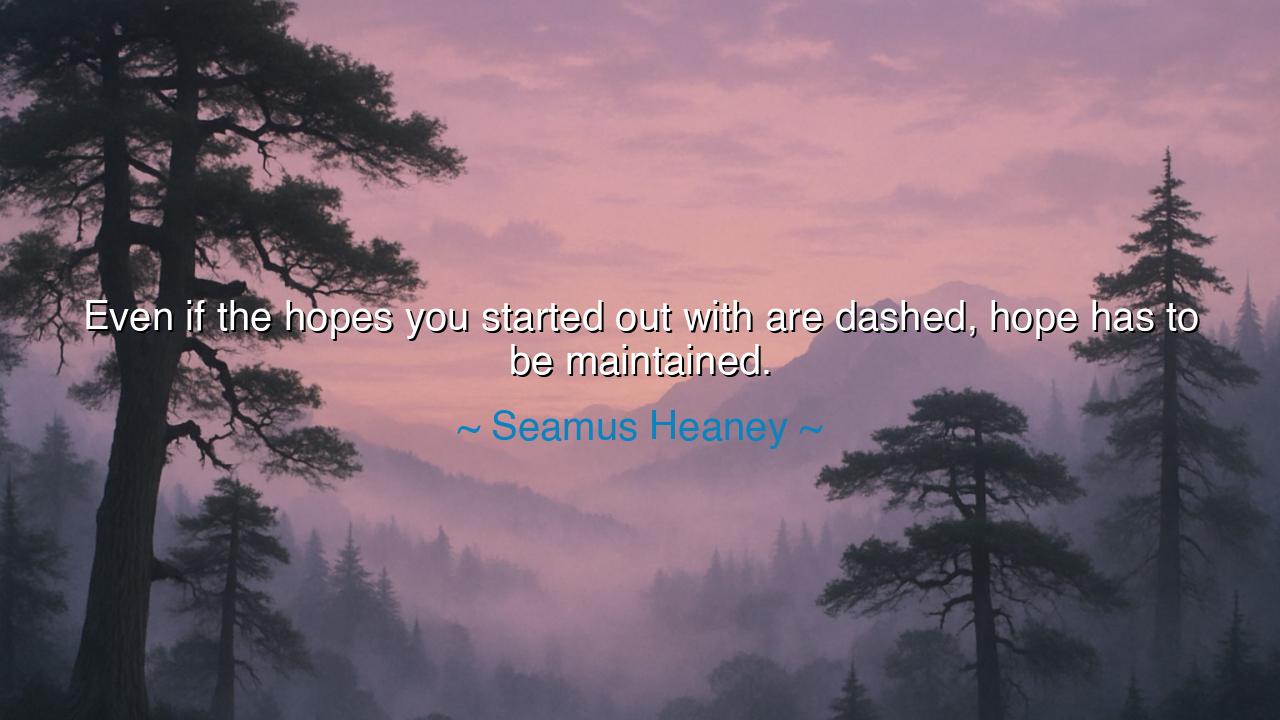
Even if the hopes you started out with are dashed, hope has to be






“Even if the hopes you started out with are dashed, hope has to be maintained.” — Seamus Heaney
Thus spoke Seamus Heaney, the poet of Ireland’s soul, whose words carried the weight of earth and the breath of eternity. In this gentle yet commanding truth, Heaney gives voice to one of the oldest songs of the human heart — the song of enduring hope. He does not promise that our dreams will always come true, nor that our paths will be smooth or crowned with victory. Rather, he teaches that hope must live on, even after the storms have torn down what we once believed secure. Hope, he tells us, is not a luxury of the fortunate; it is the duty of the living — the fire we must guard when all other lights go out.
Heaney spoke from a land and a life shaped by struggle. Born in Northern Ireland, he grew amid the tensions of political conflict and the divisions of faith. His people knew disappointment, loss, and the long ache of deferred dreams. Yet from that soil of suffering, he cultivated the flowers of compassion and endurance. In his poetry and speech, he often returned to the idea that hope is not the denial of despair, but its defiance. When he says, “Even if the hopes you started out with are dashed, hope has to be maintained,” he speaks as one who had seen the ruins of expectation — and yet believed that new life could rise from those ruins.
To maintain hope is no passive act. It is not blind optimism, nor the shallow comfort of pretending that pain does not exist. Rather, it is an act of courage — a discipline of the soul. It is to look upon broken dreams with clear eyes and say: “Still, I will believe.” Just as the farmer sows again after the harvest fails, or the sailor repairs his mast after the storm, so must we rebuild our inner faith after disappointment. Hope is the craft of the resilient, the art of beginning again when beginnings seem impossible.
History offers countless examples of those who have lived this truth. Consider Nelson Mandela, who spent twenty-seven years imprisoned in Robben Island for daring to dream of freedom. The hopes of his youth — for swift justice, for reconciliation, for liberty — were all dashed again and again by cruelty and time. Yet he maintained hope, not as a wish, but as a way of being. “I am fundamentally an optimist,” he said. “Part of being optimistic is keeping one’s head pointed toward the sun, one’s feet moving forward.” When he was finally freed, his hope had not withered — it had deepened, purified by endurance. And through that hope, an entire nation found healing.
Heaney’s wisdom also calls to each of us in quieter ways. The child who dreams of greatness but meets failure, the parent who labors for love yet feels unseen, the worker who strives through hardship — all must learn this sacred persistence. For life, as Heaney knew, is a tapestry woven with both triumph and loss. To lose hope when dreams are broken is to deny the very rhythm of existence, for even the seasons themselves teach renewal. Winter buries the earth, yet spring returns unfailingly. The heart that continues to hope through winter is the one that will see the blossoms of spring.
And what, then, sustains hope when all else fails? Faith, yes — but not faith only in God or destiny. It is faith in the human spirit, in the mysterious strength that rises each time we are struck down. It is faith that goodness still matters, even when unseen; that love still transforms, even when rejected; that light still returns, even when night is longest. Hope is the bridge between what is and what might yet be — and to keep it standing, we must be both the builders and the guardians of our own hearts.
So, my children, learn this wisdom from Seamus Heaney: do not abandon hope when your first dreams fall. For the dreams of youth are often too small for the greatness that awaits you. When they break, let them become the soil from which deeper, nobler hopes may grow. Maintain hope not because the world is kind, but because your spirit is unconquerable. Keep faith not because outcomes are certain, but because courage demands it.
For as Heaney reminds us, hope must be maintained — like a sacred flame tended through the night. When all seems lost, feed it with memory, with gratitude, with love. And when the dawn comes, as it always does, you will find that the very act of hoping has made you stronger, wiser, and more deeply alive.






AAdministratorAdministrator
Welcome, honored guests. Please leave a comment, we will respond soon